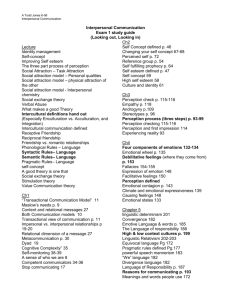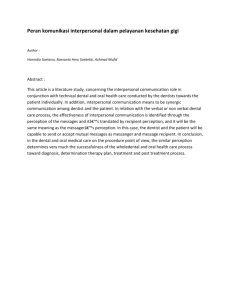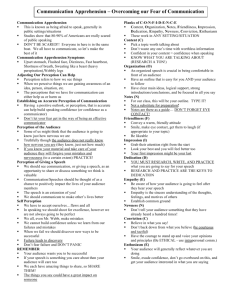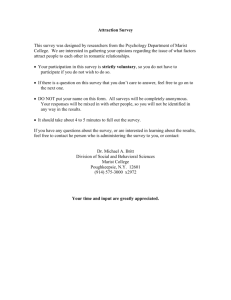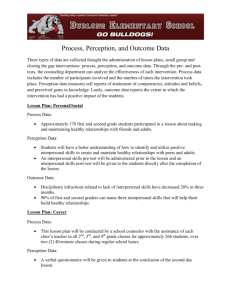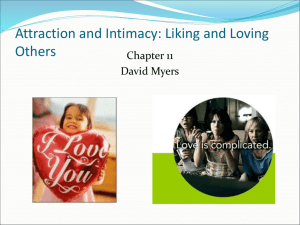Interpersonal Attraction – Friendship and Love
advertisement
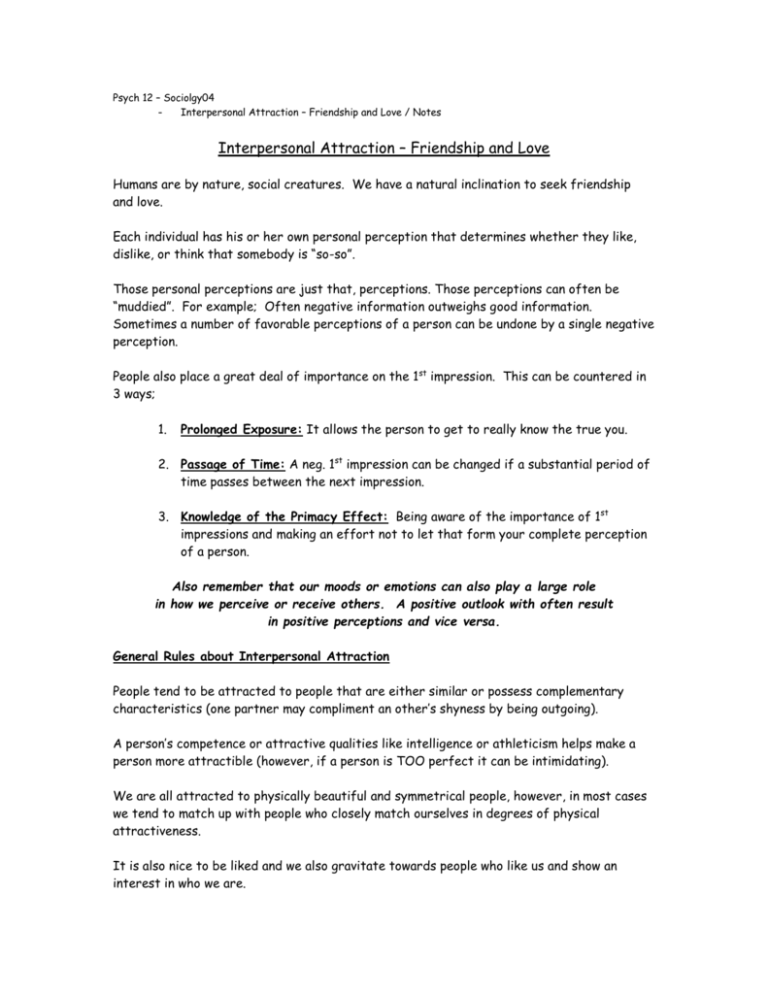
Psych 12 – Sociolgy04 - Interpersonal Attraction – Friendship and Love / Notes Interpersonal Attraction – Friendship and Love Humans are by nature, social creatures. We have a natural inclination to seek friendship and love. Each individual has his or her own personal perception that determines whether they like, dislike, or think that somebody is “so-so”. Those personal perceptions are just that, perceptions. Those perceptions can often be “muddied”. For example; Often negative information outweighs good information. Sometimes a number of favorable perceptions of a person can be undone by a single negative perception. People also place a great deal of importance on the 1 st impression. This can be countered in 3 ways; 1. Prolonged Exposure: It allows the person to get to really know the true you. 2. Passage of Time: A neg. 1st impression can be changed if a substantial period of time passes between the next impression. 3. Knowledge of the Primacy Effect: Being aware of the importance of 1st impressions and making an effort not to let that form your complete perception of a person. Also remember that our moods or emotions can also play a large role in how we perceive or receive others. A positive outlook with often result in positive perceptions and vice versa. General Rules about Interpersonal Attraction People tend to be attracted to people that are either similar or possess complementary characteristics (one partner may compliment an other’s shyness by being outgoing). A person’s competence or attractive qualities like intelligence or athleticism helps make a person more attractible (however, if a person is TOO perfect it can be intimidating). We are all attracted to physically beautiful and symmetrical people, however, in most cases we tend to match up with people who closely match ourselves in degrees of physical attractiveness. It is also nice to be liked and we also gravitate towards people who like us and show an interest in who we are. Maintaining Relationships Once “Puppy Love” is over, we are left with the question… “How long will it last?” Often relationships end because expectations are formed in the beginning that can lead to disappointment when reality comes crashing in. Relationships that tend to last, despite some degree of disappointment (we all screw up!), are relationships that offer a commitment and more importantly, equality. Those who share a true compassionate love are those who give and receive an equal proportion of benefits and contributions (50/50 is the key!). Psych 12 – Sociolgy04 - Interpersonal Attraction – Friendship and Love Interpersonal Attraction – Friendship and Love (Pt. I) Directions: READ the excerpt from Psychology – An Introduction by Ben Lahey. 1. On a separate piece of paper, define the following terms; Primacy Effect Prolonged Exposure Knowledge of Primacy Effect Passage of Time 2. On a separate piece of paper, answer the following questions using COMPLETE SENTENCES. a. In your own words describe how first impressions can lead to a negative or positive impression of an individual. Provide your own example to support your response. (2mks on quality of response and inclusion of an example) b. In your own words describe how our emotional state can play a role in our perception of others and provide your own personal experience as to when yours or another’s emotional state has resulted in a misrepresentation of another. (2 mks for explanation and example) c. Describe how the mere perception (even if unconfirmed) of physical attractiveness can altar our reaction to a person. (2 mks for quality of thought) d. In your own words, describe how and why liking someone can lead to a more favourable impression of yourself. (2 mks for quality of thought and effort) 3. In a short paragraph, describe a situation where your misperception of a person has either resulted in the termination of your contact, or how you have changed that unfavorable misperception after getting to know that person better. Be sure to describe how the misperception came about then describe the results. You will be marked out of 5 for the quality of thought and evidence of effort put into your response. Total: ___/17 Psych 12 – Sociolgy04 Interpersonal Attraction – Friendship and Love Interpersonal Attraction: Friendship and Love Excerpt from Psychology – An Introduction by Benjamin B Lahey Who are your friends? Why do you suppose you became friends with them rather than with other people you know? Are you in love with someone, or have you ever been in love? What attracted you to him or her and made you experience such intense feelings? Friendship and love are powerful social phenomena that touch all of our lives in one way or another. As such, they have been of special interest to social psychologists. In this section we look at variables that influence our perception of others, the qualities of others that make them attractive to us, and factors that are involved in the maintenance of personal relationships. Person Perception The first step toward understanding why we are attracted to one person rather than another is to understand something about the process of person perception. What factors are important in the way we perceive others? We seem to go through a complex process of “cognitive algebra” to reach an average of all the many factors that enter into our perceptions of others – with some factors contributing more to the average than others. We sum up a person as if we assign a weight to each person’s positive and negative characteristics in accordance with how important those characteristics are to us, and then we add them all together to arrive at a total perception of the person. But as the following sections show, the process of person perception is complicated further by the ways we gather and use information about others. Individual Differences in the Evaluation of Others Perhaps the most striking thing about the cognitive algebra of person perception is that different people often seem to be using different equations! Whether a characteristic is considered positive or negative and how important a weight it will carry in a person perception differs markedly from individual to individual. Jennifer may feel that an interest in sports, nutrition, and philosophy, and an outgoing personality are all highly positive characteristics. Angela may feel that these same characteristics are not very important one way or another. And Lydia might find them all to be highly negative characteristics. If Jennifer, Angela and Lydia were to meet a man with these characteristics at a party tonight, they would each form a very different perception of him. It’s like that for everyone. Because different people evaluate the same characteristics in different ways, some people are going to love you, some are going to dislike you, and the rest will find you so-so. The only difference is in how many people fall into each category. Some people have characteristics that are valued by somewhat more people in our culture than others. Negative Information: The Bad Outweighs the Good Other things being equal, we tend to assign higher weights to negative than to positive information. Put yourself in this situation: You are a person who values warmth, physical attractiveness, and honesty in others. You meet a person in class that you find extremely warm and attractive; you have an enjoyable conversation with him after class, but during the course of the conversation he asks you to help him think of a lie to tell his girlfriend explaining where he has been . You opinion of him will probably become quite negative if honesty is really important to you. The fact that he is being dishonest with his girlfriend will overshadow his positive characteristics. Most of us will pass up a delicious looking cake if we know it contains even a small amount of rat poison. Primacy Effects: The Importance of First Impression Our first impressions are usually very important in the person perception process. When you pause for a moment and think about this, it’s quite disturbing. A factor that is irrelevant to the nature of the person we are perceiving – the order in which we learn information about that person—can greatly influence our perception of that person. All of us have our good days and bad days, and it’s a shame that the perception that others form of us is influenced so much by whether they form their first impression of us on a good or a bad day. The first information that we are exposed to about a person tends to be given greater weight than later information. This is called the primacy effect. If you were introduced to Barbara right after you heard her deliver a polished and interesting talk to your sales group on the importance of ethics in business, your impression would probably be quite positive. Later, if you ran into her in a bar sitting alone, looking forlorn, disheveled, and half-drunk, you would be seeing a very different side of Barbara. But since you initial impression of her was favorable, there would be a strong tendency for you to ignore or “explain away” this new information (“Something awful must have happened to Barbara to make her act this way.”) Suppose, however, that seeing Barabara in the bar was your first exposure to her. In that case, your first impression of her would be negative and would tend to dominate your perception of her even after you were exposed to more positive information about her later. If your second meeting with her was hearing her lecture on business ethics, you would tend to discount the positive impression she was giving in that encounter (“She’s holding herself together pretty well today – I bet most people here don’t know she’s really a drunken slob”). First impressions (primacy effects) are not always of overriding importance, however, their impact can be greatly reduced under three conditions; 1. Prolonged exposure. Prolonged exposure to a person tends to reduce the importance of your first impression of that person. While it’s important to try to make a favorable first impression of that person. While it’s important to try to make a favorable first impression on the first day of your new job, do not worry about it if you do not. Eventually, your fellow employees will get to know the real you. Information about you gathered over a long period of time will erase any first impressions. 2. Passage of time. Like anything else, first impressions tend to be forgotten over time. If a substantial period of time passes between first and subsequent impressions, the more recent impression will be of greater importance. So if you flubbed your fist attempt to favorably impress that gorgeous person, wait awhile and try again later. 3. Knowledge of primacy effects. When people are warned to avoid being influenced by first impressions, the primacy effect can be reduced. Personnel managers and other to whom accurate person perception is important are educated to the dangers of primacy effects and are often able to eliminate them from their perceptions. Emotions Another important factor in person perception that can be irrelevant to the nature of the person about whom we are forming an impression is our emotions. The emotional state that we are in when we meet a person has a great deal to do with our liking that person. Positive emotional states lead to greater attraction to others than negative emotions do. William Griffith and Russell Veitch had a radio news broadcast turned on as subjects waited for an experiment in interpersonal attraction to begin. The broadcast was actually taped beforehand so that half of the subjects heard a dressing broadcast and half heard happy news. Afterwards, the subjects hearing the sad news did not like the strangers they had met in the experiment as well as the subjects who had heard the good news. These finding were confirmed in a well-designed study by Joseph Forgas and Gordon Bower (1987), who also found that we are better able to remember positive information about another person when we met him or her in a good mood, and better able to remember negative information when we meet another person in a bad mood. The effects of mood on a persons perceptions are likely, then, to be relatively enduring. So, do not introduce yourself to that person that you’ve been wanting to meet just after your football team has lost a game; wait until it wins one. Chances are he or she will be in a better mood and will like you more. General Determinants of Interpersonal Attraction Through the complicated process of person perception, a unique impression of each person is formed. But although person perception is a highly personal process, some general factors influence whether or not one person will be attracted to another. These include similar and complementary characteristics, competence, physical attractiveness and mutual liking. Similar and Complementary Characteristics In terms of interpersonal attraction, do “birds of a feather flock together” or do “opposites attract”? Are you more likely to be attracted to someone as a friend or lover who is similar to you in many ways or quite different form you? The answer is both, in different ways. Jennifer probably values people who have an interest in exercise, nutrition, and philosophy because she is also interested in those things. It’s enjoyable to have a friend to jog with, who pats you on the back for the healthy way you eat, and shares long, delicious philosophical discussions with you. In general, similarity is highly important in attractiveness. We tend to be most attracted to those people who have similar values, interests, and attitudes. Opposites can also attract, however, when the opposite characteristic complements or advantageously “fits” with one of our own characteristics. Jennifer might also be attracted to the fellow at the party tonight in part because he has an outgoing personality while she is more reserved. She may feel that she is a good listener who gets along better with talkative people than ones who are quiet like herself. And she may feel that when she is with an outgoing person at social gatherings he makes it easier for her to interact with other couples than a quiet man does. Similarly, a dominant person might prefer a submissive person, and a person who likes to nurture and “take care of” others might prefer someone who like to be taken care of. Another condition under which opposites attract is when people who are different from you like you. It’s more flattering and attractive to be liked by someone who holds opposite values and opinions than someone who holds similar ones. But take note that opposites usually do not attract; instead opposites usually repel in personal relationships. A person who intensely advocates liberal causes probably would not like a person who vocally supports conservative causes. And a highly religious person probably would not find a disdain for religion attractive in another person. Competence We tend to be more attracted to competent than to incompetent people. Intelligence, strength, social skill, education, and athletic prowess are generally thought of as attractive qualities. But people who are seen as too competent may suffer a loss in attractiveness, perhaps because it makes us uncomfortable to compare ourselves unfavorably with them. Elliot Aronson and associates conducted a clever experiment that demonstrates that it’s best to be a little less than perfect. Subjects listened to one of four audio tapes of people who were supposedly trying out to be members of their university’s College Bowl quiz team. Tow of the people scored over 90 percent correct on difficult questions and were portrayed as being honor students, athletes, and active in student activities. The other two answered 30 percent of the questions and were portrayed as average, unathletic students. Near the end of the tape one of the superior students and one of the average students blundered – each spilled a cup of coffee on himself. Who from this group do you think the subjects rated as most attractive? The two superior students were rated higher than the two average students, but the superior student who committed the blunder was rated as most attractive of all. Apparently, the slightly clumsy pratfall made him more endearing to others. However; the blunder did not have the same positive effect for the average student: The one who blundered was rated least attractive of all. Physical Attractiveness Other things equal, people tend to be more attracted to physically beautiful people. N the absence of other information, we tend to like beautiful people more, and think of them as nicer, better adjusted, and more intelligent. Not only is physical attractiveness important, it seems to be the most important factor, at least in the early stages of attraction between dates. Elaine Walster and colleagues randomly paired male and female college students for blind dates. They rate each student’s physical attractiveness and gave them test to measure attitudes, intelligence, and personality characteristics. After the blind dates, the students were asked how much they liked other and whether they intended to go out on other dates with one another. The overwhelmingly important variable in determining attractions was physical attractiveness – more so than intelligence, personality, and attitudes. The couples who were most likely to like each other well enough to continue dating were the ones in which both the male and female were attractive. One of the key ways that physical attractiveness influences interpersonal attraction was demonstrated in an ingenious experiment. Male and female college students played somewhat different roles in the study. Males were asked to participate in a study of how people get acquainted. They were asked to speak to a woman over a telephone (to rule out nonverbal communication), but each male was given written information describing the woman he was speaking to and a photograph of her. The female subjects in the study were paired randomly with the males on the other end of the telephone, but the information sheets and pictures had nothing to do with them. All of the information sheets seen by the male subjects were the same, but half of the males saw a picture of a very attractive woman and half saw a picture of a much less attractive woman. After they had talked with her on the telephone, the men who thought they were talking to a beautiful woman rate her as being more sociable, poised, and humorous than did the men who thought they were talking to an unattractive woman. As in previous studies, greater physical attractiveness led to greater likability. But that’s not the most interesting finding in this study. When observers rated tape recording of the males’ conversations, they found that males who thought they were talking to a beautiful woman spoke to her in a more sociable way (e.g., warm, outgoing, interesting) and were rated as enjoying themselves more in the conversation. Thus, perceiving the woman as beautiful, led the men to be more charming towards her. Perhaps even more interestingly, recorded conversations of the female subjects were also rated. They knew nothing about the pictures the men were seeing, but when the man thought that the woman was beautiful, the women spoke in a more charming, confident manner and were rated as seeming to like the man more. Apparently, thinking the woman was beautiful led the man to not only like the woman better from the start, but to treat her in a way that induced her to act in a more likable way. If Alan think he will like Eileen because she is pretty, he will probably speak to her in ways that will bring out her most likable side. It’s a lovely self-fulfilling prophecy, if you happen to be physically attractive. But, don’t despair; there may be some hope for the rest of us yet! While we might all prefer to be dating Brad Pitt or Jennifer Aniston, people tend actually to choose dates and mates who closely match themselves in degree of physical attractiveness. What is more, physical beauty is a highly subjective quality. So, even if you do not think your next-door neighbour is much to look at, chances are that someone else will soon come along who thinks he or she is just beautiful. Perhaps the nicest thing about physical attractiveness and liking, though is that the relationship goes both ways. Not only is it true that we tend to like people better when we think they are beautiful, but as we get to like people better, we begin to think they are more beautiful. So to a certain extent, love is blind and beauty is in the eye of the beholder. And nothing could be nicer. Mutual Liking Let’s end this discussion of factors involved interpersonal attractiveness on an upbeat note. Liking often leads to liking in return. If Vicki likes Neil, she has made herself more attractive to Neal simply by liking him. Neil, if he is like most everyone else, will be more attracted to people who like him than to people who do not like him. Liking someone will not turn you into an irresistible beauty, but it will help. One reason why this seems to be so is that liking someone actually makes you more physically attractive, especially if a little lust is thrown in. You have heard people say that a person is more beautiful when in love, and it’s true. Your eyes are more attractive. The pupils are more dilated (opened) when you look at someone you find sexually attractive, and others find large pupils more attractive sexually. And your posture and movements are more attractive and seductive. In subtle ways, you are more physically alluring when you are attracted to another. Another reason that liking tends to lead to liking is that you are nicer to the people that you like, and being nicer makes you more attractive to them. A number of studies show, for example, that we tend to like people more when they praise us or when they have done favours for us. Favours and praise feel nice and we like the giver better for having given them to us. So, send him flowers or give her a CD – it might just tip the balance of love in your favour. As you might expect, there are limits on the impact of praise and favours. If they excessive, and especially if the other person thinks you are insincere and have selfish motives for giving them, praise and gifts will not lead to increased liking and may even lessen the liking.
